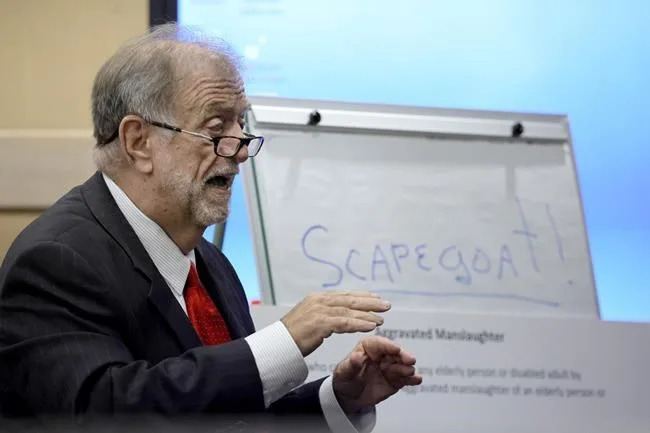Mon, February 6, 2023

FORT LAUDERDALE, Fla (AP) — A Florida nursing home administrator charged with causing the overheating deaths of nine patients after Hurricane Irma in 2017 went on trial Monday, with a prosecutor calling him a “captain who abandoned ship” while his attorney said he's a “scapegoat” for failures of the electric company to restore power.
Prosecutor Chris Killoran told the six-member jury that Jorge Carballo is guilty of manslaughter because he failed to give adequate direction to his staff at the Rehabilitation Center at Hollywood Hills after power to the facility's air conditioning system was lost. He said Carballo went home even as it became “ridiculously hot” inside the 150-bed, two-story facility and failed to order his patients' evacuation to Memorial Regional Hospital across the street, which had working air conditioning.
Prosecutors must prove Carballo acted recklessly and showed gross and careless disregard for his patients' safety. Carballo, 65, could face 15 years in prison if convicted, although a sentence of that length would be unlikely as he has no previous record. He was originally charged with 12 deaths, but three cases have been dropped. Charges were also dropped against three of his employees, who will testify against him.
“This is a case of a captain who abandoned his slowly sinking ship, and left not only his crew but the passengers to fend for themselves,” Killoran said. As temperatures rose inside the center, Carballo “basically did nothing,” he said.
“He had his staff buy some fans to push some hot air around and had some portable AC units installed,” he said, but that wasn't done properly, making the temperatures on the second floor where the deaths occurred even worse.
But defense attorney James Cobb said Carballo did everything within his power to protect his patients. He had his staff notify Florida Power & Light that the air conditioning's power was down right after it happened and several more times over the next two days, Cobb said, but the company didn't send a crew until an executive saw news reports about patients dying. He said the problem took 10 minutes to fix.
He said Carballo was following published research that shows moving frail, elderly patients comes with a high risk of death.
“This case can be boiled down to one word — scapegoat," Cobb said. The attorney previously won the acquittal of two New Orleans nursing home owners who were charged after 35 patients drowned during flooding in 2005 after Hurricane Katrina.
Cobb, scoffing at Killoran's characterization of Carballo abandoning ship, showed the jury two photos of Carballo working with his staff during the emergency. He said Carballo is on trial to avoid placing the blame where it belongs — on the power company.
“Hurricanes are unpredictable. Stuff happens during hurricanes that can't be planned for. If something happens that can't be planned for, you do the best you can,” he said.
The victims, ranging in age from 57 to 99, had body temperatures of up to 108 degrees (42 degrees celsius), paramedics have reported.
The deaths began three days after Irma knocked out a transformer that powered the cooling system. Otherwise, the facility never lost power.
A state report said that before the storm hit on Sept. 10, 2017, Carballo and his staff made appropriate preparations. They purchased extra food and water and fuel for the generator.
Administrators also participated in statewide conference calls with regulators, including one where then-Gov. Rick Scott said nursing homes should call his cellphone for help.
After the air conditioner failed, Carballo and his facility manager contacted the power company. When that didn’t work, they called Scott’s cellphone and county and city officials. No help came.
Temperatures that week were in the upper 80s (about 31 degrees Celsius). On Sept. 12, two days after the storm, patients from the nursing home began arriving at Memorial Regional's emergency room with temperatures of 103 degrees (39.4 Celsius) and above.
About 6 a.m. on Sept. 13, after more patients arrived, Memorial's then-head nurse Judy Frum and her assistant, Tracy Meltzer, walked to the home to offer assistance. Both testified Monday that when they entered, the heat struck them and the home's staff seemed frantic. Paramedics were already there.
“It was really hot. I can only relate it to opening a car door and the heat hits you in the face,” Frum said.
Meltzer said that when she reached the second floor, she found two men dead in one room and a woman lying in a diaper filled with urine and feces. She heard one of the home's nurses say, “They are dropping like flies. We have to get these people out of here.” After she, Frum and paramedics conversed, the fire department decided to evacuate the home and take everyone to the hospital, where a mass casualty alert was called.
“Patients were being compromised to the heat. Some were expired. We made a group decision to take patients out of the building,” Frum said.
Under cross-examination, Carballo attorney David Frankel tried to get Frum and Meltzer to concede that they over-reacted and that the patients would have been better off staying at the home. At one point, Frankel insinuated that by calling a mass casualty alert, the nurses had attracted national media attention to the situation it otherwise wouldn't have received.
Frum and Meltzer responded they could feel the heat, see dead patients and others in distress.
“It was not a safe place to be. We removed the patients from harm," Frum said.
The trial is expected to last about three weeks.
Terry Spencer, The Associated Press
No comments:
Post a Comment